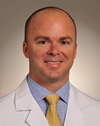In The News
Dr. Andrew Spitzfaden, St. Luke's Hospital

Non-surgical treatment is often the cure for Runner's Knee
Patellofemoral pain , also called Runner's Knee , is a common cause of knee pain that often affects young, otherwise healthy and athletic people. It affects twice as many women as men, but the reason is currently unknown. Some research suggests it may be due to structural differences between men and women in which women experience more forces on the outside portion of the patella (kneecap). This leads to undersurface irritation of the kneecap and subsequent knee pain .
Other factors that cause kneecap problems include flat feet, dislocation, injury, excessive training or overuse and tightness, imbalance or weakness of thigh muscles. Improper shoe selection (i.e. high heels) can also intensify kneecap pain.
Symptoms include tenderness behind or around the kneecap. You may feel pain toward the back of the knee, a sense of cracking or a feeling that the knee is giving out. Steps, hills, squatting, sitting with a bent knee for extended periods of time and uneven terrain can also aggravate patellofemoral pain .
For runners, prevention involves the use of proper running shoes with good shock absorption and inserts if you have flat feet. You should also use proper running form, leaning forward while keeping your knees bent, and try to run on smooth and reasonably soft surfaces. Adequate stretching before and after exercise and maintaining a healthy weight can also help.
The good news is that treatment is usually non-surgical. Sufferers can avoid aggravating activities like running and switch to lower impact or non-weight-bearing activities such as swimming. Some people find relief by applying cold packs for short periods of time several times a day, using neoprene knee sleeves with the kneecap cut out or taking over-the-counter anti-inflammatory medications like ibuprofen or acetaminophen. Physicians may also prescribe physical therapy or a home exercise program.
It is important to remember that several weeks of rest may be needed to allow irritated cartilage to settle down. Following rest, it is critical to return slowly to normal activities and your usual training schedule. Surgical treatment is rarely necessary and may involve arthroscopic procedures to remove damaged cartilage or to realign the kneecap.
Dr. Andrew Spitzfaden specializes in orthopedic surgery and sports medicine at St. Luke's Hospital. Call 314-576-7013 or visit his Physician Referral page.
This article was published in the St. Louis Post-Dispatch on October 21, 2010.
